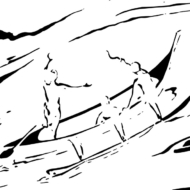or, Settler Mess in the Cells of Australian Poetry
Colony collapse disorder describes a phenomenon whereby worker bees have suddenly and inexplicably disappeared from a hive. It has also been mobilised as a syndrome following the rapid vanishing of Western honeybee colonies across North America and Europe. Justin Clemens has also used the term to describe aesthetic collapse, whereby poets can only demonstrate their existence as “being caught dead” given the fragile conditions of poetry and the inevitable, deadly effects of the past. This organic metaphor for the social as well as for the aesthetic figures the individual as having a singular function that is, nevertheless, integrally networked to other individuals. What I am interested in exploring in this paper is an alternative model of sociability that focuses on correspondences in otherwise unconnected ‘bees’ and the capacity for transformation in the face of a past that continues to contaminate and render the present ‘toxic’. In Infidel Poetics , Daniel Tiffany argues that lyric obscurity could be viewed as the ground or medium of negative sociability. The shrinking domain of modern poetry readership encapsulates a model of social hermeticism more generally. The materiality of language could be said to house a verbal underworld: the “privacy effects” of the poem is a structure of both lyric and social obscurity that works through generating a common knowledge dependent on expressive and reciprocal correspondence s among its solipsistic readers . Poetry might be seen then as a way of activating ‘sleeper cells’ within the hive, underworlds of activity that may then inform what Foucault calls “new relational modes” . I am interested in exploring in this paper both the materials and the craft employed by generation X poets to generate a social and aesthetic hive in the wake of colonialism and late capitalism. It is envisaged that this paper would look at the poetry of Clemens himself, Sam Wagan Watson, Michael Farrell, Keri Glastonbury, Duncan Hose, and Fiona Hile but also possibly others. I will consider elements such as absurdity, symbolic analogy, “perpetually collapsing second – order allegory” , camp, irony, the vernacular, use of the readymade, and grammatical disruption.
Audio
Date Recorded: 14 Sep 2014Duration: 41:09




